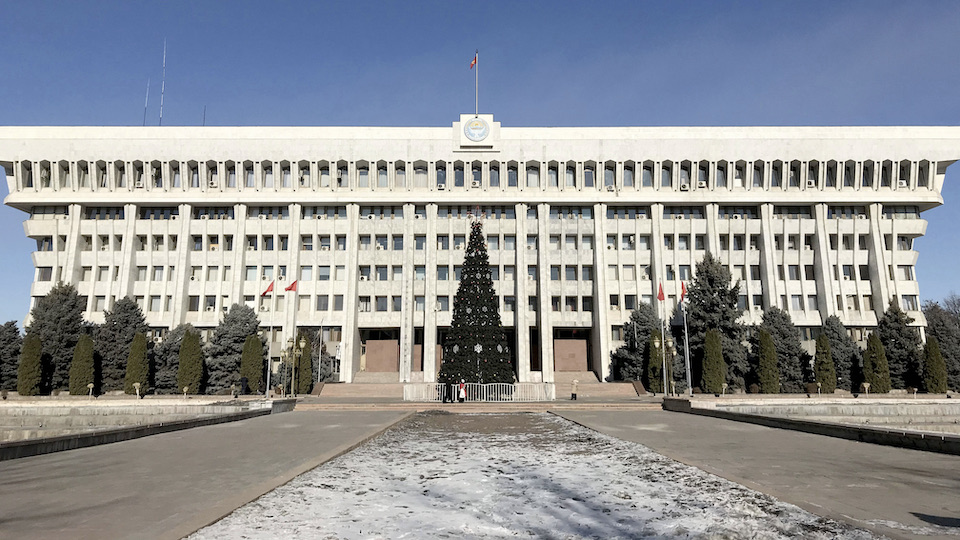New law threatens freedom of expression in Kyrgyzstan

The law passed by parliament would allow the government of Kyrgyzstan to block websites without a court order. The human rights organisation Human Rights Watch (HRW) sees this as a threat to freedom of expression in the Central Asian country with its estimated 6.5 million inhabitants. It is therefore calling on President Sadyr Japarov not to sign the law.
Parliament had passed the “false information” law on 28 July. It stipulates that an unnamed state agency can initiate the blocking of internet sites that contain information classified as “false” or “inaccurate”. This would include statements that offend the honour and dignity of a person or a company or undermine their reputation. The authority is to take action following complaints from those affected.
HRW fears that the new law could be applied to statements that do not constitute defamation. This is already covered by existing laws.
Syinat Sultanalieva, Central Asia researcher at Human Rights Watch, criticised: “The new ‘misinformation’ law poses a serious threat to freedom of expression and media freedom in Kyrgyzstan and would deeply damage the country’s human rights reputation.” It paves the way for state-led censorship and contradicts national and international human rights obligations, she said.
Mandatory registration for internet users
The law also requires all internet users in Kyrgyzstan to register by name. Internet providers are to transmit this data to a state system. HRW criticises that this regulation violates the right to privacy and expands the authorities’ possibilities to monitor, track and censor individual users. The organisation therefore fears that the law could have a chilling effect on government critics.
The law does not specify which government agency is responsible for its implementation, nor does it specify penalties.
Human Rights Watch also accuses the parliament of having passed the law in disregard of the rules on legislation. After all, the then President Sooronbai Cheenbekov had already vetoed the planned predecessor law in July 2020. The parliament had then decided to convene a mediation committee. It would have had ten days to do so, but only implemented the project over a year later in May 2021.
Lawyers from the local media organisation Media Policy Institute also expressed concern that neither representatives from civil society nor media professionals were invited. According to them, this was necessary after the president’s veto.
By the end of June, the law had not received the necessary majority in parliament. In the end, it was only passed after President Japarov, who was elected in January, invited MPs to his residence: 97 MPs then voted in favour and only five voted against.
Fears of autocratic development
HRW reports that this is the second time the parliament has exceeded its mandate to pass a far-reaching law that violates international human rights standards. Kyrgyzstan has ratified the International Covenant on Civil and Political Rights, which guarantees, among other things, the right to privacy and freedom of expression.
President Japarov is controversial: he has several convictions (in German) and is considered a supporter of the authoritarian regime (in German) that was overthrown in 2010.
In April, a constitutional amendment initiated by Japarov in a referendum was adopted. It gives the president more power (in German): he can appoint and dismiss the presidents of the Constitutional Court and the Supreme Court. Critics had warned in advance of the development towards an autocracy.
Further restriction of media freedom and freedom of expression feared
The new constitution also prohibits events as well as the dissemination of information that contradict “the moral and ethical values and public consciousness of the Kyrgyz people”. The new article is supposedly intended to protect children. Human Rights Watch had already warned in March that the provision was incompatible with basic human rights to freedom of expression and assembly. The term “public consciousness of the people” is worrying because it is broad and insufficiently defined and thus open to abuse.
HRW is now calling on President Sadyr Japarov to veto the “misinformation” law. The European Union and the USA should also express their concern to the President about the threat to freedom of expression and media.
Kyrgyzstan boasts that it has more media freedom and freedom of expression compared to its neighbouring countries. Sultanalieva warned of further restrictions should the law come into force: “This law would put Kyrgyzstan on the path to denying these freedoms.” (js)